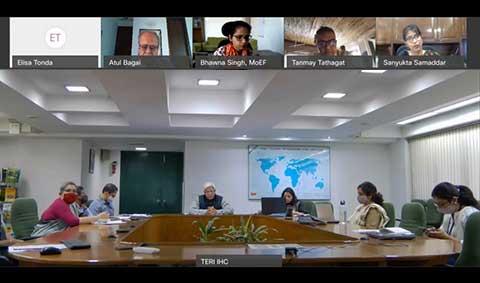To enable robust reporting of India’s progress in achieving Sustainable Development Goal (SDG) 12, India should strengthen its data monitoring and reporting, recommended TERI in a draft study report. The report recommended reporting of six categories of natural resources – metal ores, non-metallic minerals, coal, petroleum, natural gas, and groundwater, and strengthening of periodic reporting of consumer and consumption data along with the strengthening of data reporting by municipalities.
The draft report was presented at the ‘National Consultative Roundtable Dialogue on Reporting and Monitoring of SDG 12 – Responsible Consumption and Production’, organised under the EU funded SWITCH-Asia Programme, in partnership with the United Nations Environment Programme (UNEP) and The Energy and Resources Institute (TERI). The dialogue was organised to present the draft study report prepared by TERI on ‘SDG 12 – An analysis of the SDG 12 National Indicator Framework and Recommendations for its Monitoring and Reporting’ and explore the way forward for strengthening the national reporting process on Goal 12.
Sustainable consumption and production (SCP) is an integral part of the global agenda and is one of the seventeen SDGs adopted by member states of the United Nations, including India. SDG 12 focuses on ensuring responsible and sustainable consumption and production by encouraging policy measures and implementation for reducing wasteful use of resources by both producers and consumers.
There is an urgent need to facilitate a dialogue across the Asia Pacific region in SDG 12 reporting. According to the Progress Report prepared by the Ministry of Statistics and Programme Implementation (MoSPI), the Government of India, for SDG 12 indicators, only two targets with a total of three indicators have data availability. The rest either have no baseline data or the national indicator has not yet been developed. To bridge this gap, the Regional Policy Advocacy Component (RPAC) of the SWITCH-Asia initiated a national activity through the UNEP, and in collaboration with the Ministry of Environment Forest and Climate Change (MoEFCC), Government of India, to support and strengthen the national reporting process on SDG 12. This national activity fructified in the presentation of this draft report.
The report, which was presented to gather stakeholder feedback, also suggested that as far as possible the national indicators on SCP should be harmonised with global indicators. While global indicators are useful in the voluntary reporting to be done at the international level, national indicators can help India informing and sharpening national and state policy.
The Dialogue held at TERI and online brought together over 50 national experts and multi-stakeholders, including representatives from MoEFCC and MoSPI, to deliberate on issues covered under various targets under SDG 12 including SCP policy, fiscal instruments, waste management, resource use, public procurement, sustainability reporting, education, international cooperation and sustainable tourism.
At the event, Mr Atul Bagai, Head, India Country Office, UNEP, said, “The process to produce SDG 12 Monitoring and Reporting Framework for India has brought focus on the fact that ‘participation is a significant element needed to achieve the overall SDG. This product presents the analysis and also the way forward that will systematise and strengthen the SDG 12 monitoring and reporting in India. UNEP as the global custodian for 10 of the 13 indicators of SDG 12 is proud of the success achieved by MoEFCC, India on the advancement of SDG 12 reporting.”
Adding to this Mr RR Rashmi, Distinguished Fellow and Programme Director, TERI stated, “TERI carried out this study in cooperation with UNEP and with support of EU funded SWITCH-Asia RPAC to help develop an informed approach for SDG 12 monitoring and reporting in India. The objective is to develop a coherent approach for reporting on all indicators based on the resource value chain. The study also highlights the need for policy guidelines and interventions at national and state levels to help implement this approach.”
Ms Cecilia Costa, Team Leader Operations, India and Bhutan, EU Delegation in India also welcomed the participants by saying, “SDG 12 is a cross-cutting goal with a central role to promote resource-efficient and a low carbon path. India’s progress in achieving Goal 12 and Agenda 2030 will support climate neutral, circular and inclusive growth. The EU stands as a strong supporter of SCP in the region but also globally. We are pleased to be able to contribute to strengthening SDG 12 reporting in India in partnership with UNEP and MoEFCC.”
Chair of the Dialogue Dr Mushtaq Ahmed Memon, Regional Coordinator Resource Efficiency UNEP Asia Pacific Office, SWITCH-Asia RPAC Project Manager emphasised, “The need to facilitate dialogue across the Asian region on SDG 12 reporting has been reinforced during the Global Emergency such as COVID 19. The SWITCH Asia RPAC is providing technical assistance to governments and supporting them in improving their national strategies and action plans with regard to sustainable production and consumption practices.”
Sanyukta Samaddar, Adviser (SDGs), NITI Aayog, said that all SDGs are reliant on SDG12 and its linkages with other SDGs are very high but are often overlooked. “An established methodology needs to be devised (for reporting). Data is required not just at the national, but also the sub-national level,” she added.
To know more, please check TERI.

